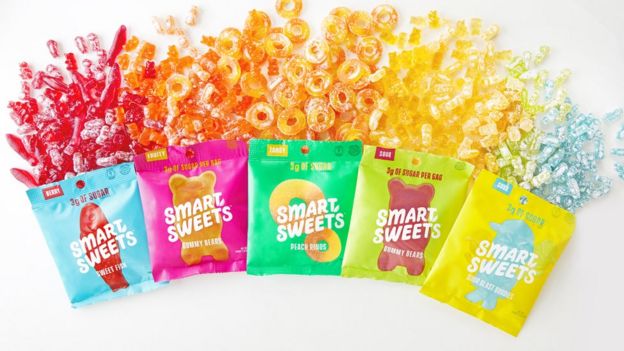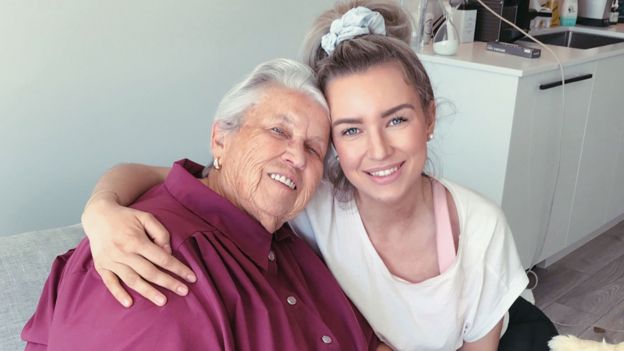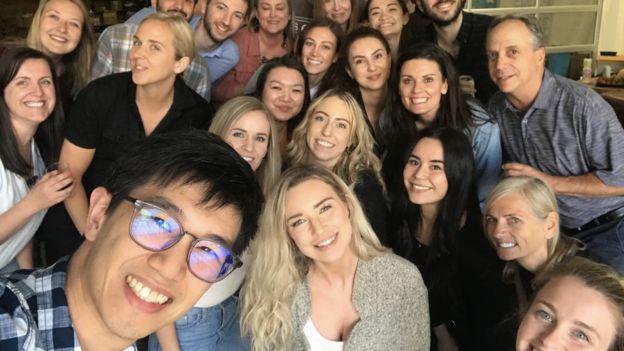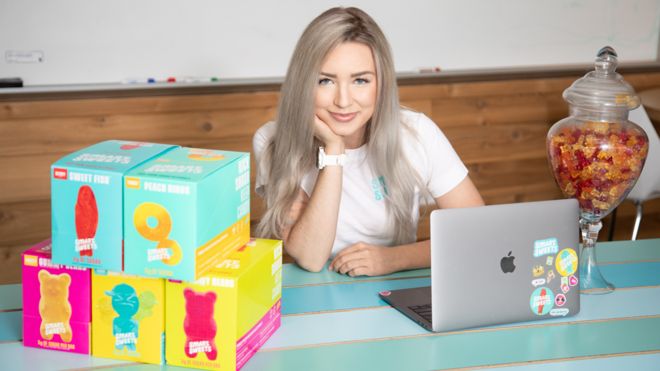The Boss series profiles different business leaders from around the world. This week we speak to Tara Bosch, the founder and chief executive of low-sugar sweets business Smart Sweets.
Tara Bosch describes herself as a former "sugar addict".
"I would be the person at the 7-11 every day, buying the penny candy," says the 25-year-old. "But as I got older, I realised how much sugar was affecting my body image, my self-esteem, and just how I felt about myself."
So four years ago, fed up with how unhappy and unhealthy she was feeling, Tara stopped eating sugar. She says that she very quickly felt much better, but missing her sweets she decided to have a go at making her own no-added sugar alternatives in her kitchen in Vancouver, Canada.
Testing recipes in the summer of 2015, she described it as "going on a quest". Eventually she was so pleased with her results that she thought there might be a business opportunity.
 The business is planning to expand outside of North America
The business is planning to expand outside of North AmericaThat autumn she decided to take a leap of faith, and put this to the test. Tara dropped out of the third year of an arts degree at the University of British Columbia, so she could get the product off the ground.
Just 21 at the time, she had limited credit history, and her only asset was a six-year-old small Honda car. But armed with samples and confidence, she managed to secure 105,000 Canadian dollars of funding.
Today, her Vancouver-based company, Smart Sweets, is on track to see its 2019 revenues exceed CA$50m ($40m; £30m). Its range of products are market leaders in the fast-growing low-sugar sweets sector in both Canada and the US.
"This year we are helping people kick more than one billion grams of sugar," she says.
 Tara says that her grandmother's own battles with sugar was another inspiration behind the business
Tara says that her grandmother's own battles with sugar was another inspiration behind the businessTo secure the initial investment Tara had to write an intensive business plan, with detailed two-year growth forecasting. And somewhat unnervingly, she had to take out life insurance. "One of the terms of the parties involved was life insurance, and they had to be the beneficiary," she says.

Sugar-free or not?
If you're looking to cut down on your sugar intake but have a sweet tooth, then sugar-free sweets can be better than the regular sweets, say dieticians. But they may still contain carbohydrates, and some can contain significant calories and be high in saturated or trans-fats.
"Keep in mind that just because a product is 'sugar free' it doesn't always mean that it's healthy," says the American Heart Association.
Some studies also suggest that certain zero-calorie sweeteners may also stimulate appetite, which can be counterproductive for those trying to limit their calorie intake.

With the funded secured, Tara searched on the internet for potential suppliers and manufacturers, and worked on finalising her recipes.
"It soon became a trial and error of taking every single iteration that didn't work, and applying a new hypothesis, and then testing it again." she says.
Tara settled on using plant-based fibres, and the natural sweetener stevia, to mimic the taste and texture of traditional sugared sweets.
Then to secure her first customers she used a mixture of emailing, telephoning, showing up in person, and, she says, "Linkedin-ing". The first retailer to sign up was Vancouver-based Choices Market, and Tara remembers that she was incredibly nervous ahead of the first meeting.
"I had called and emailed with persistence, until they finally said stop by," she says. "And when I arrived out front, I was so nervous that I drove away.
"Then I drove back, had the meeting, and they became the first retailer to take a chance on Smart Sweets."
 The company employs 47 people
The company employs 47 peopleA few other small Canadian chains followed shortly afterwards. "Like I said, it's about persistence," she says. "I would email and show up until a business would say yes to a conversation, and from there I leveraged the success."
Tara secured her first American customers in 2018, and the US now accounts for 80% of Smart Sweets' sales. The manufacturing of the sweets also takes place in the US through contract suppliers.
US food entrepreneur and strategist Scott Semel says he is impressed by Tara's "passion".
"An annual revenue of CA$50m is very successful," says Mr Semel, who in 2016 sold his best-selling confectionary brand Bark Thins to US giant Hershey.
"Just getting to $5m isn't easy, and confectionary is dominated by a few big players. I think what's even more impressive about doing CA$50m in 2019 is the time frame in which she has achieved it.
"Tara has a great feel for the market... she thinks far ahead."

Now with 47 employees, Tara plans to start exporting Smart Sweets outside of North America. She says that the success of the company has come through hard work and determination.
"For me growing up, I wasn't that smart or athletic," she says. "I didn't really have any talents in particular, but I always had an innate sense of urgency, resourcefulness, and the ability to make something happen if I decided I wanted to make it happen.
"Smart Sweets was the first time I realised the power of those three things combined."
SOURCE: BBC



